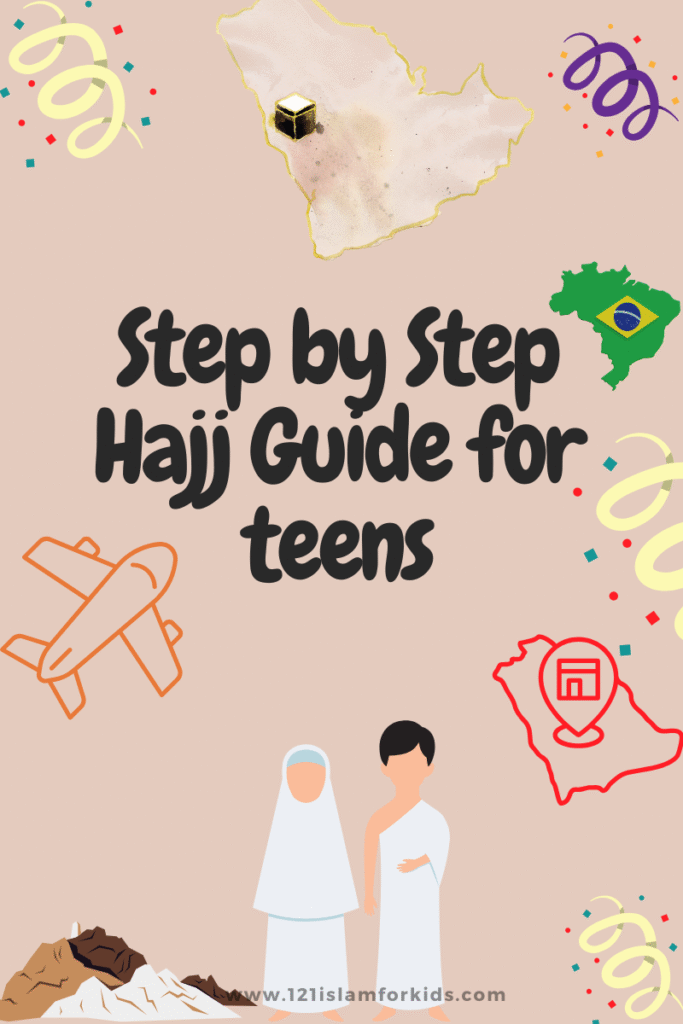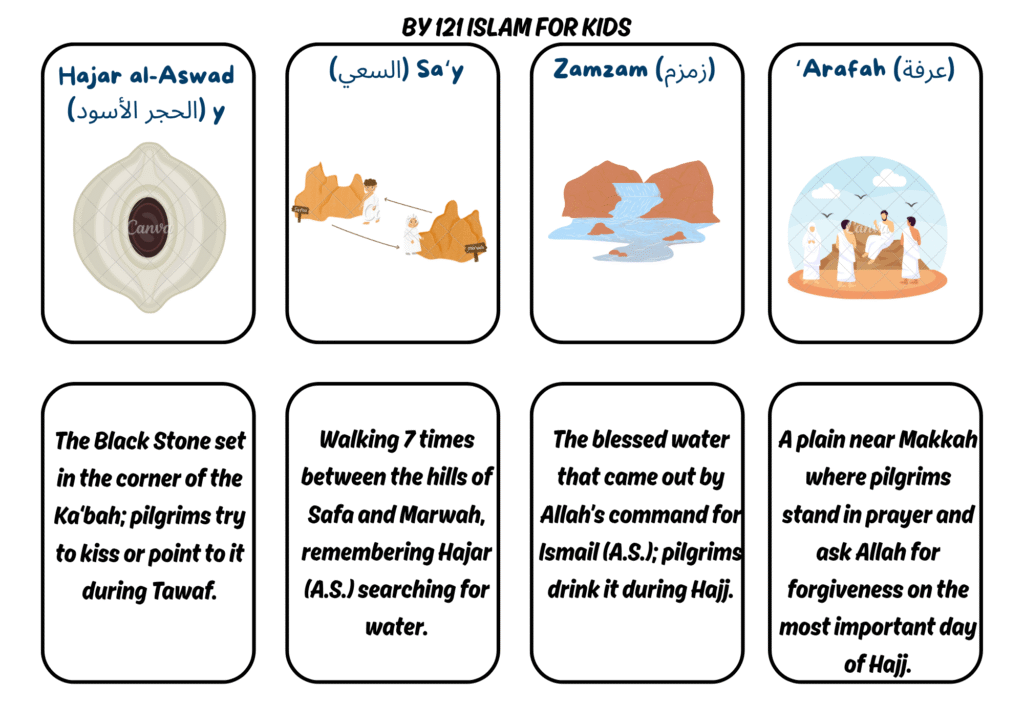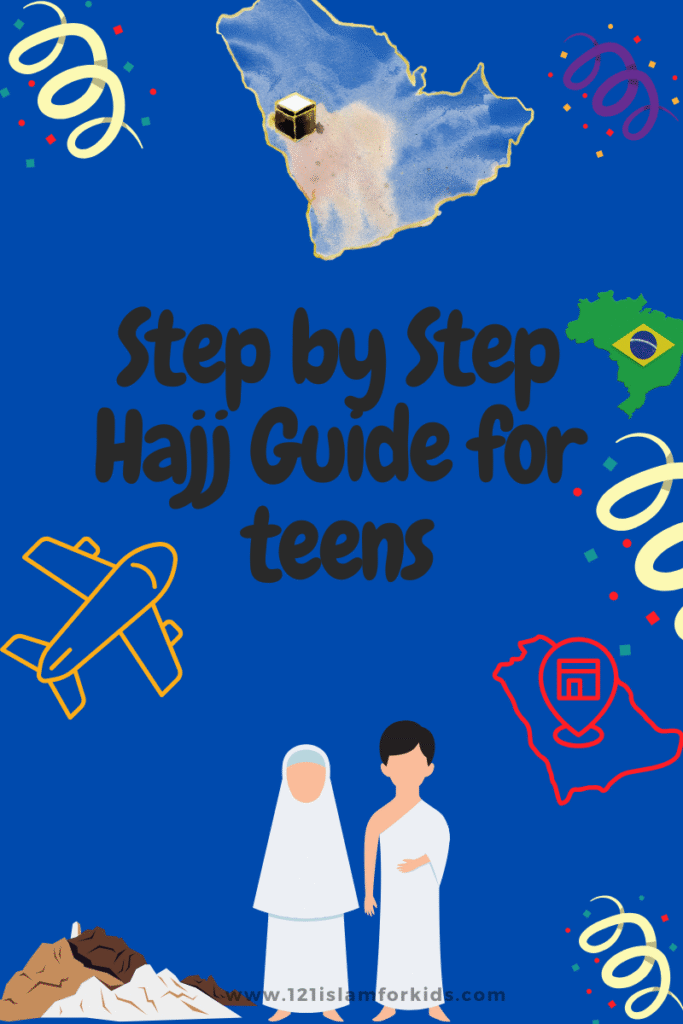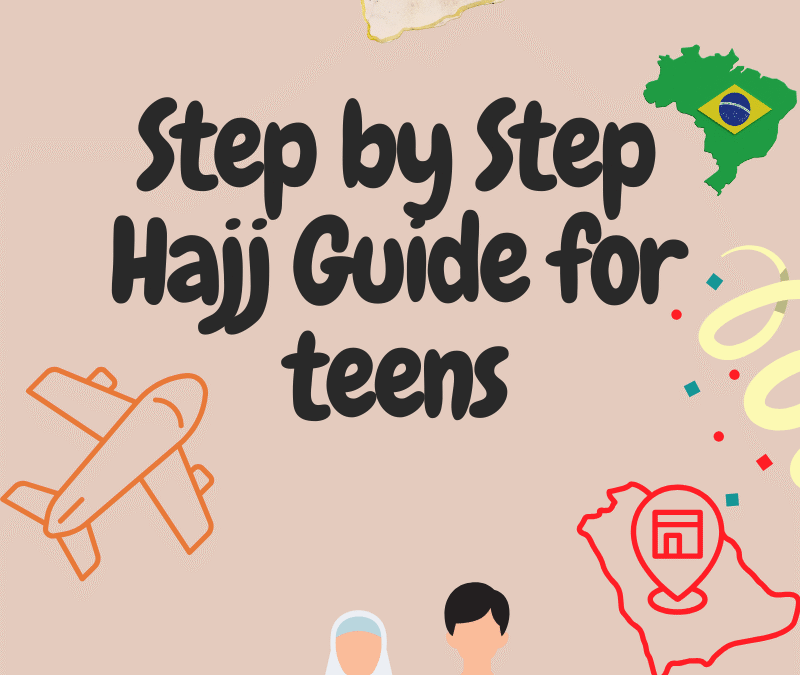Introduction to the course Hajj guide for teens:
The Meaning and Obligation of Hajj

Hajj is the fifth pillar of Islam. It is an obligation upon every adult Muslim who is physically and financially able to make the journey to Makkah at least once in their lifetime. Allah says:
“And [due] to Allah from the people is a pilgrimage to the House - for whoever is able to find thereto a way.” (Surah Aal Imran, 3:97)
The Prophet Muhammad (peace be upon him) said:
“Islam is built upon five: testifying that there is no god but Allah and Muhammad is the Messenger of Allah, establishing the prayer, giving zakah, fasting Ramadan, and Hajj to the House.” (Bukhari & Muslim)
If a child performs Hajj before reaching adulthood, it is valid and rewarded, but they must perform it again after reaching maturity to fulfill the obligation.
Hajj Guide no 1: Preparation Before Hajj
Start preparing weeks before your trip:
- Learn the steps of Hajj and memorize important duas.
- Get comfortable walking long distances. Pack light but wisely.
- Essentials: 2 sets of Ihram for boys, modest clothing for girls, prayer mat, unscented toiletries, water bottle, small backpack, power bank, and basic medicines.
If arriving in Makkah early, spend your time in worship: perform Umrah, attend prayers at the Haram, and rest. Ihram must be worn at the Miqat. If traveling by plane, put on Ihram before passing the Miqat line (your airline will announce it).
Day 1: 8th Dhul-Hijjah (Yawm at-Tarwiyah)
Make niyyah (intention) for Hajj and enter Ihram. Begin reciting the Talbiyah:
“Labbayk Allahumma Labbayk...”
Travel to Mina and settle into your tent. In Mina, you pray Dhuhr, Asr, Maghrib, Isha, and Fajr (shortened but not combined). This is a day of preparation and calm.
Tips:
- Stay hydrated; it can be very hot.
- Use the time to review Hajj steps and reflect.
- Keep your bag with essentials nearby: sandals, water, and a mini Quran.
Spiritual reflection: Mina symbolizes the beginning of total submission to Allah. You leave comfort behind for devotion.
Day 2: 9th Dhul-Hijjah (Arafah)
After Fajr in Mina, travel to the plains of Arafah. Stay there until sunset. Pray Dhuhr and Asr shortened and combined. This is the most important day of Hajj.
The Prophet (peace be upon him) said, "Hajj is Arafah." (Tirmidhi)
Spend the day making du'a, reading Quran, and seeking forgiveness. This is the day Allah forgives the most people.
After sunset, head to Muzdalifah (do not pray Maghrib until you arrive). In Muzdalifah, pray Maghrib and Isha combined, then sleep outdoors. Collect 49 or 70 pebbles for the coming days.
Tips:
- Keep a prayer list ready. Make heartfelt du'as.
- Carry a lightweight mat or sheet to sleep on in Muzdalifah.
- Have snacks handy; food is limited.
Spiritual reflection: Arafah reminds us of the Day of Judgment. Standing here is a deep plea for Allah’s mercy.
Day 3: 10th Dhul-Hijjah (Eid Day)
Return to Mina. Perform Ramy al-Jamarat by throwing 7 pebbles at the largest pillar (Jamarah al-Aqabah).
Offer the Qurbani (animal sacrifice). Then, men shave or trim their hair, and women cut a small portion. You can now exit Ihram partially (you can change clothes but avoid intimacy).
Go to Makkah and perform Tawaf al-Ifadah (7 circuits around the Kaaba) and Sa’i (between Safa and Marwah).
Tips:
- During Tawaf, stay calm. Hold your group’s hand if needed.
- Stay on the outer part of the crowd to avoid being pushed.
- Bring your du'a book or phone app to read supplications.
Spiritual reflection: Today is about overcoming Shaytan (by stoning), showing obedience (like Ibrahim’s sacrifice), and purifying the soul.
Days 4 & 5: 11th–12th Dhul-Hijjah (Tashreeq Days)
Stay in Mina. Each day, throw 7 pebbles at all three pillars: small, medium, and large Jamarat.
“Remember Allah during the appointed days...” (Surah Al-Baqarah, 2:203)
You can leave Mina after Maghrib on the 12th if you wish. If staying for the 13th, repeat the stoning once more.
Tips:
- Go to the Jamarat early to avoid heavy crowds.
- Count your pebbles ahead and keep them in separate pouches.
- Reflect on each stone: you're symbolically throwing away sins and temptations.
Spiritual reflection: This act reminds you to fight the whispers of Shaytan every day in your life.
Final Step: Tawaf al-Wada (Farewell Tawaf)
Before leaving Makkah, perform one last Tawaf around the Kaaba. This is your goodbye to the House of Allah.
Tips:
- Do this with a clean heart, thankful and humble.
- Make du'a to return for another Hajj or Umrah.
Spiritual reflection: The journey ends, but the lessons stay with you. You leave Makkah with a new heart, closer to Allah.
May Allah accept your Hajj and make it a source of lifelong guidance and blessing.
Get Free flsh Cards and Hajj riddels here.






